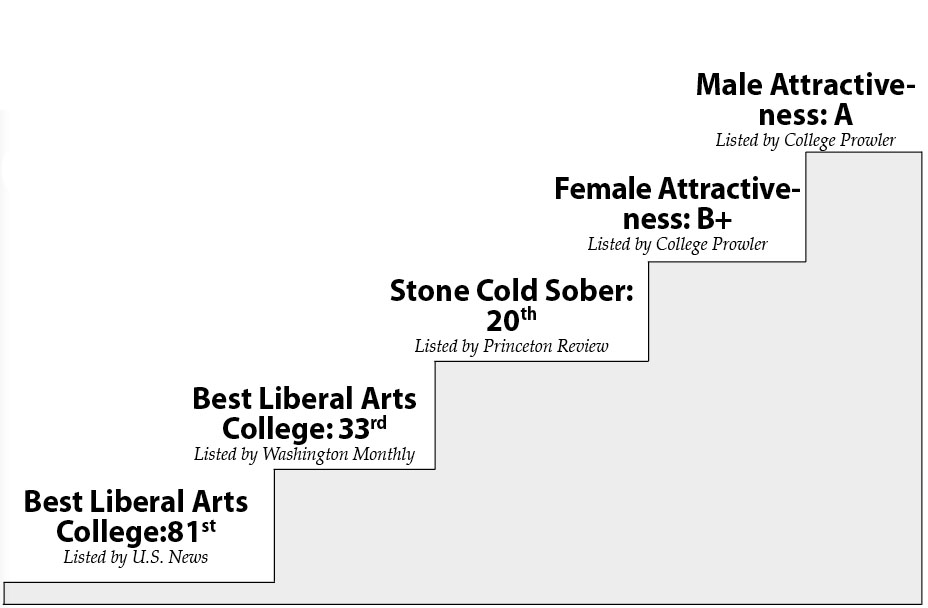According to the Washington Monthly, Gustavus is the 56th best liberal arts college in the country. It places 81 on the U.S. News list of best liberal arts colleges. It is on the list of Best Midwestern Colleges according to The Princeton Review and it received a B+ for attractiveness of the girls on campus according to College Prowler (for the record, boys received an A).
Where do these ratings come from, and what do they mean?
U.S. News, which publishes the most-quoted “Best Colleges” list, published their first edition in 1983, and has published it annually since 1985.
In the twenty-five years that these lists have been compiled, a precise formula for ranking has been developed. First, colleges are split into categories, including national universities, regional universities, and national liberal arts colleges, which is the category Gustavus falls in.
The schools are then rated on academic quality using up to sixteen weighted indicators based on research done by U.S. News. The indicators include, for example, assessment by administrators at peer institutions, retention of students and alumni giving. Some colleges are excluded, including most 2-year institutions and those that don’t use ACT or SAT scores at all in the admissions process. Using this formula, Gustavus got a score of sixty-two out of one hundred and ranked #81 out of one hundred and seventy-eight ranked schools.
“Generally, students use [the rankings] as … one tool in the application process, rather than the sole basis of their decision,” Robert Morse, director of data resources at U.S.News said. Morse said U.S. News filled an information gap that was left by a lack of high school counselors and a symptom of those counselors that remained being overworked.
“I think international and first-generation students weigh them most heavily,” Morse said.
The main difference between U.S. News rankings and other organizations like The Princeton Review is the methodology.
U.S. News, as stated above, uses an information-based model, while The Princeton Review and College Prowler base their rankings on student interviews and include many diverse categories.
The Princeton Review features categories like most LGBT-Friendly, Great College Towns, Birkenstock-Wearing, Tree-Hugging, Clove-Smoking Vegetarians, Most Conservative Students, and Best Campus Food, among many others. They collect most of their information directly from student surveys.
The Princeton Review ranks Gustavus 20 on the “Stone Cold Sober” list and includes it in their three hundred and seventy-six best colleges. It is also on the list of the Best Midwestern Colleges.
College Prowler also bases its rankings on student feedback. They rank colleges on traditional categories, such as academics, diversity and local atmosphere, but also include offbeat subjects such as girls, guys, nightlife and parking. They hire student authors and send out surveys in order to gather their information.
College Prowler ranks Gustavus low in off-campus housing and diversity, but gives it high ratings in campus dining, health & safety and facilities. The overview, written by a College Prowler student author, states that “the four years on the Hill fly by quickly and then the real world waits. Enjoy the community, warmth and “small town bubble” while you still can. There simply is no college quite like it.”
It is clear that College Prowler and The Princeton Review, while not using a scientific formula to calculate ratings, offer a more personal view of the schools with anecdotal information and student-based ratings.
Tom Crady, Vice President for Enrollment Management in Admission at Gustavus, said that Gustavus focuses its efforts on personalizing the admissions process rather than spouting off ratings.
“We don’t really use rankings [in advertising]. We want to convey [our] specialness … we try to answer their questions personally,” Crady said.
“There are a lot of really great schools … but parents are starting to look at the ratings differently and it doesn’t seem as big of a factor now,” Crady said. He said Gustavus has seen a steady increase in the amount of applications received.
“Interest [in Gustavus] is skyrocketing,” he said, which he believes is indicative of the total package Gustavus offers—a quality education at a competitive price, especially in an unsure financial climate.
As for students, they seem to share the sentiments Crady brought up. First-year Physics Major Brianna Mork focused on the physics program’s rank during her college search. Gustavus’ nationally ranked physics department was a decisive factor in her choice to come here, Mork said.
However, students that don’t have a specific major in mind seem to care most about the liberal arts aspect of the college, an experience that is hard to quantify.
“Having a good liberal arts program was very important to me … I want to be a well-rounded person,” First-year Music Education Major Daniel Felton said.
Matt Kessler, a First-year undecided major, agreed, saying, “I knew Gustavus had a strong liberal arts program, but the actual rankings were not important.”

This is an excellent posting. You have my vote and I will bookmark this website right now.
It is really interesting post. I never read such kind of post. It impressed me. Thanks for sharing…
Hello, Neat post. There’s a problem with your website in internet explorer, might check this? IE still is the marketplace leader and a large component of people will pass over your magnificent writing because of this problem.